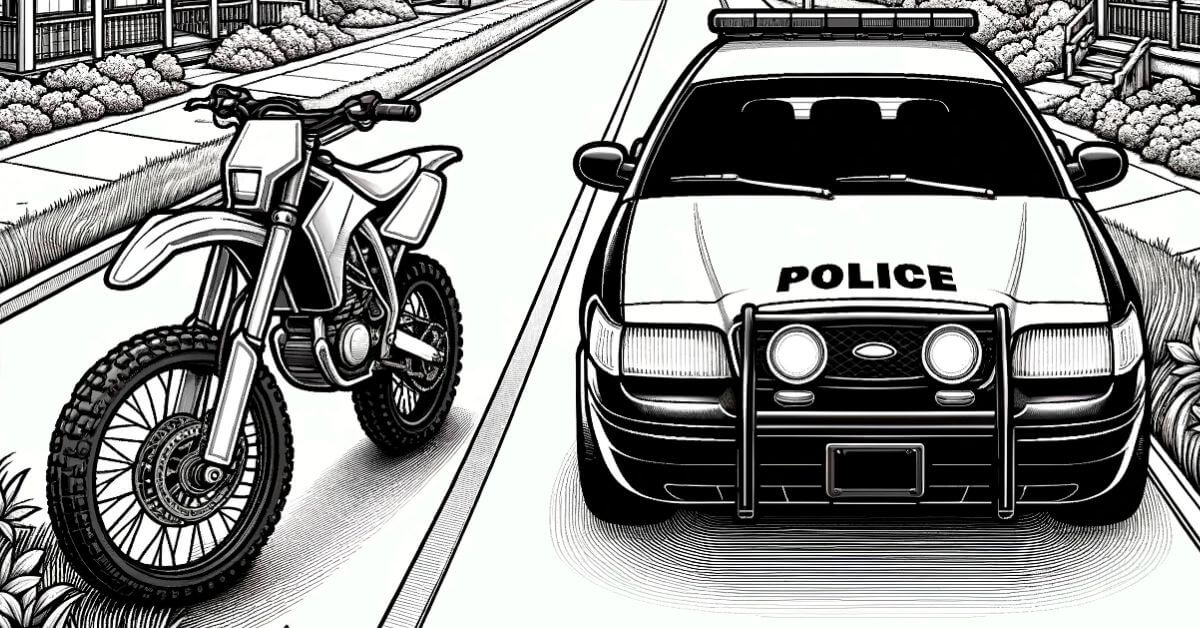Officers in our case today from the Seventh Circuit had suspicions of drug activity and used what could potentially be seen as stalling tactics to ensure that a canine could arrive on the scene. According to the 2015 SCOTUS case, Rodriquez v. US, a seizure justified only by a police-observed traffic violation “becomes unlawful if it is prolonged beyond the time reasonably required to complete the mission” of issuing a ticket for the violation. This means that you have to let someone go after you complete writing the ticket. Let’s review what happened in our case today and how it played out for our officers involved.
Facts
Detectives Jonathan Roseman and Matthew Hund saw William Goodwill driving a vehicle with windows tinted noticeably darker than allowed by Illinois law and followed him to a nearby rest stop. The detectives relayed this information to dispatch, which notified all marked units in the area, including an officer with a drug-sniffing canine who started driving toward the scene. When the detectives initiated the traffic stop at 1:58 p.m., Detective Roseman approached Goodwill and requested his driver’s license and insurance information. He then asked Goodwill to come sit in his squad car while he processed the paperwork, to which Goodwill agreed. Once Goodwill sat down in the police car, Detective Roseman performed a “records check” utilizing two law enforcement databases. During this time, Detective Roseman asked Goodwill questions about his car, the weather, his child, the length of his stay in the area, any plans for his time there, and his driving history.
At 2:02 p.m., Detective Roseman received confirmation from his database checks that Goodwill’s information was accurate. At 2:03 p.m., Detective Roseman began filling out the hard-copy of the written warning citation. While writing the warning, Detective Roseman asked Goodwill about his job, the vehicle Goodwill was driving and whether Goodwill had taken any drugs or medications. During this time, one of the detectives had also messaged the canine unit to “hurry.”
At 2:07 p.m., the officer arrived with the canine. One minute later, before completing the warning, Detective Roseman asked Goodwill if he would consent to the drug dog sniffing around his car. Goodwill agreed four times to allow the search. Detective Roseman then returned to writing up the warning while the officer walked around the car with the drug dog. The dog alerted to the presence of illegal drugs. The officers searched the car and found two kilograms of cocaine.
The government charged Goodwill with possession of cocaine with intent to distribute. Goodwill filed a motion to suppress the drugs, arguing that the officers unlawfully prolonged the duration of the stop by: 1) asking Goodwill to relocate to the squad car while the paperwork was being processed; 2) asking questions that were unrelated to the traffic offense; and 3) conducting the dog sniff without his consent. The district court denied the motion. Goodwill subsequently pled guilty, reserving the right to appeal the denial of his suppression motion.
Seventh Circuit Court Opinion
The Seventh Circuit Court of Appeals affirmed the district court’s ruling. First, the court recognized that a police officer can ask a driver to sit in the police car for the duration of a traffic stop without any “particularized suspicion” that the driver is dangerous or otherwise poses a threat to the officer.
The court also noted that a traffic stop can last only long enough to complete the “mission” of the stop, that is, “to address the traffic violation that warranted the stop and attend to related safety concerns.” An officer may ask questions concerning matters unrelated to the reason for the traffic stop as long as those questions do not prolong the stop “beyond the time reasonably required to complete the mission.”
In this case, the court agreed with the district court which found that Officer Roseman worked diligently on the warning as he was asking questions, which did not unreasonably prolong the duration of the stop. For example, Officer Roseman continued to check Goodwill’s driver’s license and vehicle information on the police computer, then waited for returns from the database, and finally wrote the warning, while he asked Goodwill questions.
Finally, an officer does not need a driver’s consent to conduct a dog sniff during a lawful traffic stop, if it does not prolong the stop. Given that the officers were still processing the paperwork for the stop when the canine unit arrived, the court held that they did not need Goodwill’s consent to conduct the search.
Takeways
A couple of key points here: number one, a police officer can ask a driver to sit in the police car for the duration of a traffic stop without any “particularized suspicion” that the driver is dangerous or otherwise poses a threat to the officer. This is a good tip for those of you who want to get the full report from the driver, and it allows you to safely stay in your vehicle versus worrying that a driver may speed off. And number two, an officer does not need a driver’s consent to conduct a dog sniff during a lawful traffic stop, if it does not prolong the stop. If your canine gets to the scene while your stop is still being conducted, that canine can sniff the car. The duration of this entire stop clocked in at around ten minutes, which was only reasonable because the officer was still writing the report and ticket.
United States v. Goodwill, 24 F.4th 612 (7th Cir. 2022)



